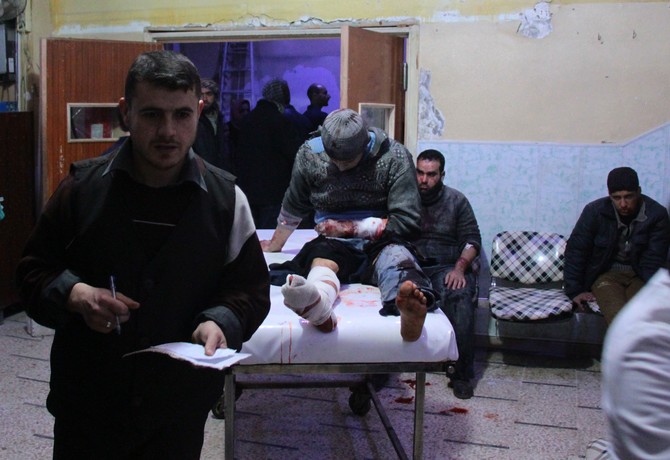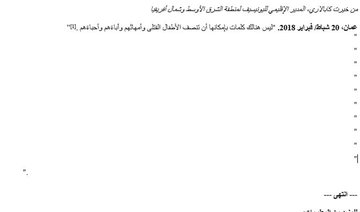BEIRUT: A key hospital in Syria’s rebel-held Eastern Ghouta was put out of service on Tuesday, a medical group said, with a monitor blaming Russian air strikes.
“The Arbin hospital was hit twice today and is now out of service,” said Moussa Naffa, country director in Jordan for the Syrian American Medical Society (SAMS), which supported the clinic.
The news came as the United Nations said six hospitals had been hit in Eastern Ghouta in the past 48 hours, in addition to the one reported by SAMS.
The Syrian Observatory for Human Rights said the Arbin hospital was hit by a pair of Russian air strikes, in what would be the seventh hit in the past two days.
According to the Britain-based war monitor, it is the first time in three months that Russia has conducted raids on Eastern Ghouta, which it had designated last year as a “de-escalation” zone.
An AFP photographer in Arbin saw a Russian Sukhoi Su-34 fighter jet soaring overhead on Tuesday.
The United Nations said Tuesday that six hospitals have been struck in the past 48 hours in Eastern Ghouta, putting three out of service and killing several people.
“I am appalled and distressed by reports of the horrifying attacks against six hospitals in East Ghouta over the past 48 hours,” said Panos Moumtzis, the UN’s regional humanitarian coordinator for the Syria crisis.
At least 81 civilians were killed on Tuesday, including 15 civilians, in a fierce regime bombing campaign on the rebel-controlled enclave that began on Sunday.
The total civilian deaths since then, according to the Observatory, number at least 225 with hundreds more wounded.
Eastern Ghouta is the last rebel bastion on the capital’s outskirts and Syrian President Bashar Assad appears more determined than ever to capture it.
An estimated 400,000 people live in the besieged region.
Six Syria enclave hospitals bombed in two days: UN
Six Syria enclave hospitals bombed in two days: UN

Israeli strikes hit Yemen’s Sanaa and Hodeidah, Houthis’ Al Masirah TV says

- Houthis said that multiple air raids targeted an airport, military air base and a power station in Yemen
JERUSALEM: Multiple air raids hit several targets in Houthi-held areas of Yemen on Thursday, witnesses and the militia said, with their media saying Israel launched the strikes.
Sanaa airport and the adjacent Al-Dailami base were targeted along with a power station in Hodeida, in attacks that the Houthis’ Al-Masirah TV channel called “Israeli aggression.”
There was no immediate comment from Israel on the strikes, which come a day after Yemen fired a ballistic missile and two drones at Israel.
On Saturday, a Houthi missile attack left 16 people wounded in Tel Aviv.
Saturday’s incident had prompted a warning from Israeli Prime Minister Benjamin Netanyahu, who said he had ordered the destruction of Houthi infrastructure.
“I have instructed our forces to destroy the infrastructure of Houthis because anyone who tries to harm us will be struck with full force,” Netanyahu said in parliament.
“We will continue to crush the forces of evil with strength and ingenuity, even if it takes time.”
Syria authorities say torched 1 million captagon pills

DAMASCUS: Syria’s new authorities torched a large stockpile of drugs on Wednesday, two security officials told AFP, including one million pills of captagon, whose industrial-scale production flourished under ousted president Bashar Assad.
Captagon is a banned amphetamine-like stimulant that became Syria’s largest export during the country’s more than 13-year civil war, effectively turning it into a narco state under Assad.
“We found a large quantity of captagon, around one million pills,” said a balaclava-wearing member of the security forces, who asked to be identified only by his first name, Osama, and whose khaki uniform bore a “public security” patch.
An AFP journalist saw forces pour fuel over and set fire to a cache of cannabis, the painkiller tramadol, and around 50 bags of pink and yellow captagon pills in a security compound formerly belonging to Assad’s forces in the capital’s Kafr Sousa district.
Captagon has flooded the black market across the region in recent years, with oil-rich Saudi Arabia a major destination.
“The security forces of the new government discovered a drug warehouse as they were inspecting the security quarter,” said another member of the security forces, who identified himself as Hamza.
Authorities destroyed the stocks of alcohol, cannabis, captagon and hashish in order to “protect Syrian society” and “cut off smuggling routes used by Assad family businesses,” he added.
Syria’s new Islamist rulers have yet to spell out their policy on alcohol, which has long been widely available in the country.
Since an Islamist-led rebel alliance toppled Assad on December 8 after a lightning offensive, Syria’s new authorities have said massive quantities of captagon have been found in former government sites around the country, including security branches.
AFP journalists in Syria have seen fighters from Islamist group Hayat Tahrir Al-Sham (HTS) set fire to what they said were stashes of captagon found at facilities once operated by Assad’s forces.
Security force member Hamza confirmed Wednesday that “this is not the first initiative of its kind — the security services, in a number of locations, have found other warehouses... and drug manufacturing sites and destroyed them in the appropriate manner.”
Maher Assad, a military commander and the brother of Bashar Assad, is widely accused of being the power behind the lucrative captagon trade.
Experts believe Syria’s former leader used the threat of drug-fueled unrest to put pressure on Arab governments.
A Saudi delegation met Syria’s new leader Ahmed Al-Sharaa in Damascus on Sunday, a source close to the government told AFP, to discuss the “Syria situation and captagon.”
Jordan in recent years has also cracked down on the smuggling of weapons and drugs including captagon along its 375-kilometer (230-mile) border with Syria.
Jordan says 18,000 Syrians returned home since Assad’s fall

AMMAN: About 18,000 Syrians have crossed into their country from Jordan since the government of Bashar Assad was toppled earlier this month, Jordanian authorities said on Thursday.
Interior Minister Mazen Al-Faraya told state TV channel Al-Mamlaka that “around 18,000 Syrians have returned to their country between the fall of the regime of Bashar Assad on December 8, 2024 until Thursday.”
He said the returnees included 2,300 refugees registered with the United Nations.
Amman says it has hosted about 1.3 million Syrians who fled their country since civil war broke out in 2011, with 650,000 formally registered with the United Nations.
Lebanon hopes for neighborly relations in first message to new Syria government

- Lebanon’s Iran-backed Hezbollah played a major part propping up Syria’s ousted President Bashar Assad through years of war
- Syria’s new Islamist de-facto leader Ahmed Al-Sharaa is seeking to establish relations with Arab and Western leaders
DUBAI: Lebanon said on Thursday it was looking forward to having the best neighborly relations with Syria, in its first official message to the new administration in Damascus.
Lebanese Foreign Minister Abdallah Bou Habib passed the message to his Syrian counterpart, Asaad Hassan Al-Shibani, in a phone call, the Lebanese Foreign Ministry said on X.
Lebanon’s Iran-backed Hezbollah played a major part propping up Syria’s ousted President Bashar Assad through years of war, before bringing its fighters back to Lebanon over the last year to fight in a bruising war with Israel – a redeployment which weakened Syrian government lines.
Under Assad, Hezbollah used Syria to bring in weapons and other military equipment from Iran, through Iraq and Syria and into Lebanon. But on Dec. 6, anti-Assad fighters seized the border with Iraq and cut off that route, and two days later, Islamist militants captured the capital Damascus.
Syria’s new Islamist de-facto leader Ahmed Al-Sharaa is seeking to establish relations with Arab and Western leaders after toppling Assad.
Iraqi intelligence chief discusses border security with new Syrian administration

BAGHDAD: An Iraqi delegation met with Syria’s new rulers in Damascus on Thursday, an Iraqi government spokesman said, the latest diplomatic outreach more than two weeks after the fall of Bashar Assad’s rule.
The delegation, led by Iraqi intelligence chief Hamid Al-Shatri, “met with the new Syrian administration,” government spokesman Bassem Al-Awadi told state media, adding that the parties discussed “the developments in the Syrian arena, and security and stability needs on the two countries’ shared border.”
















